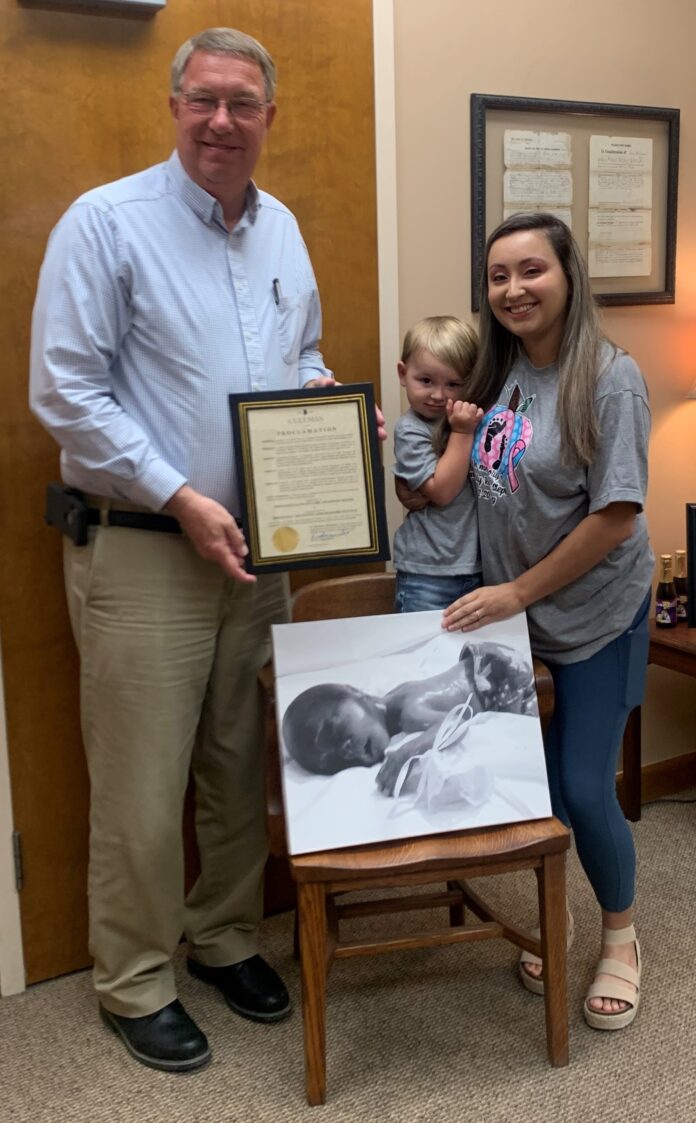
CULLMAN, Ala. – Each year, 1 in 4 pregnancies end in tragedy. To demonstrate support for the many families in our community who have experienced pregnancy loss or infant death, Cullman Mayor Woody Jacobs has proclaimed the month of October 2021, “Pregnancy and Infant Loss Awareness Month” and October 15, 2021, “World Pregnancy and Infant Loss Remembrance Day.”
During the month of October, people are encouraged to learn more about how pregnancy and infant loss can be prevented, and how to support bereaved families when prevention is not possible.
On October 15, people are asked to join with other families across the world to create a “Global wave of light” by lighting a candle at 7:00 p.m. local time and leave it burning for at least one hour to remember all babies that have died. People can also participate digitally by taking a photo of their candle and posting it to social media using the #WaveofLight hashtag at 7:00 p.m. local time.
Celeste Stephens and her two-year-old son, Emmett Scott Stephens, received the proclamation from Mayor Jacobs in a small ceremony at Cullman City Hall on Tuesday, September 28, 2021. Celeste’s husband Phillip is in the U.S. Army and was unable to attend.
“The grief experienced by families who experience the loss of a pregnancy and death of a baby is profound,” said Mayor Jacobs. “It’s an issue that’s often difficult for us to talk about, and many of us aren’t sure how to support these families, so I’m proud to proclaim ‘Pregnancy & Infant Loss Awareness Month’ to help increase awareness and educate the public on this issue.”
Celeste contacted the Mayor’s Office requesting the proclamation because she and her husband, Phillip, know first-hand the pain of losing a child.
“Our daughter Emberly Rose Stephens was born on December 20, 2017,” said Celeste. “She was a micro preemie, born at 21.1 weeks weighing only 14 ounces and measuring only 10 ½ inches. She passed away two hours after she was born.”
The loss of their daughter inspired Celeste to become involved in promoting pregnancy and infant loss awareness.
“As parents, we do anything to protect our children,” Celeste added. “But when they are no longer with us on earth, we try to do everything possible to make sure they are remembered in any way possible.”
Pregnancy and infant loss is a term that includes miscarriage (pregnancy loss before 20 weeks of pregnancy), stillbirth (fetal death after 20 weeks of pregnancy, either before or during delivery), neonatal death (death of an infant during the first 28 days of life) and the death of an infant before his or her first birthday.
According to the March of Dimes, approximately 10-15% of pregnancies in which women know they’re pregnant end in miscarriage. The exact number of miscarriages is likely much higher, since miscarriages often happen before women know they’re pregnant. The Centers for Disease Control (CDC) estimates that stillbirths occur in about one pregnancy in 100. Each year, about 24,000 babies are stillborn in the United States. Why miscarriages and stillbirths occur isn’t always known, but common causes include genetic abnormalities or maternal health issues or pregnancy complications.
Infant loss occurs at a rate of about 5.6 deaths per 1,000 live births, according to the CDC. Common causes of the death of infants before their first birthday are birth defects, preterm birth and low birth weight, injuries and Sudden Infant Death Syndrome (SIDS) or Sudden Unexpected Infant Death (SUID).
“Children are supposed to grow up and, we hope, leave a good impact,” said Celeste. “But for those that don’t get the opportunity to grow up and live long fulfilled lives, we as parents hope to make an impact for them and let people know that ‘Hey! Our babies were here, and they mattered too!’”
In 1988, U.S. President Ronald Reagan declared October as the month to recognize the unique grief parents experience due to pregnancy and infant loss and to demonstrate support for families who have suffered such loss. Since that time, various organizations have promoted awareness of pregnancy and infant loss with the goal of increasing the likelihood that grieving families will receive understanding and support, and that improvements in education and prevention efforts may ultimately reduce the incidence of these tragedies.
One such organization is the Star Legacy Foundation, a community of health professionals, families, researchers, policy makers and advocates dedicated to healthy pregnancy outcomes and stillbirth prevention. Their #NeverBeStill campaign seeks to break the silence surrounding stillbirth and other pregnancy and infant losses by educating the public about ways to support families who experience pregnancy and infant loss and to empower expectant mothers to have healthy pregnancies.
“I appreciate Celeste working to bring awareness to this issue and to help other families who have experienced the kind of loss she has experienced,” said Mayor Jacobs. “I urge our citizens to take part in the ‘Wave of Light’ event on October 15 and to find ways to support families in our community who are grieving because of pregnancy and infant loss.”
Pregnancy and infant loss prevention
While all miscarriages and stillbirths cannot be prevented, there are some things women can do before and during pregnancy to increase the chances of having healthy babies. These include:
- Receiving prenatal care.
- Ensuring that chronic medical conditions, such as high blood pressure and diabetes, are under control before and during pregnancy.
- Avoiding smoking cigarettes during pregnancy.
- Striving to reach and maintain a healthy weight before pregnancy.
- Taking precautions against illnesses.
As with miscarriage and stillbirth, there are often no definite ways to prevent many of the leading causes of infant mortality. However, there are ways to reduce the risk of infant death. These include:
- Having your baby seen regularly by a health care professional and screened for certain conditions that are not noticeable at the time of birth but can cause serious disability or even death if not treated quickly.
- Creating a safe sleeping environment, including placing a baby on his or her back to sleep and keeping the sleep area free of soft objects or toys or loose bedding.
The Alabama Department of Public Health (ADPH) established the Perinatal Program to identify and recommend strategies that will effectively decrease infant morbidity and mortality. The program encourages cooperative relationships among healthcare providers and institutions to ensure medically effective and cost-efficient perinatal care and helps to raise awareness regarding infant morbidity and mortality. The ADPH’s Fetal and Infant Mortality Review (FIMR) Program was established as a community-based statewide initiative designed to enhance the health and well-being of women, infants and families through the review of unidentified individual cases of stillbirth and infant deaths and voluntary maternal interviews. Both of these state programs can be found on the ADPH website at https://www.alabamapublichealth.gov/index.html.




















